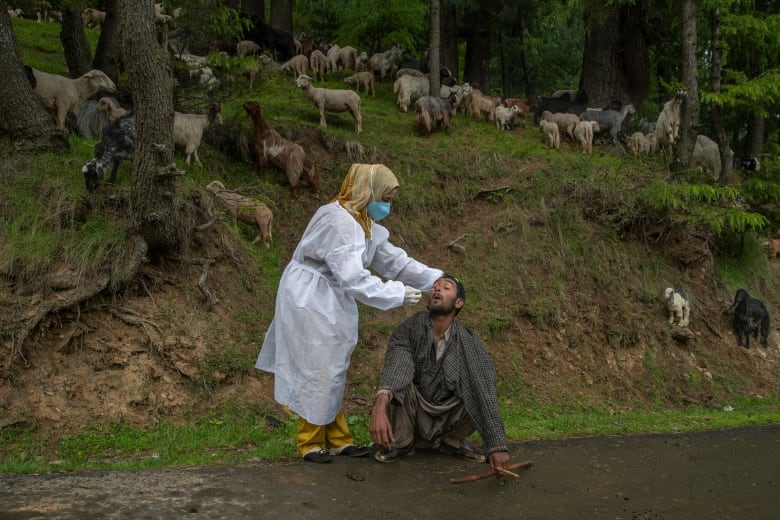X-Files
2
"
Canada is winning the vaccine lottery. Other countries aren't so lucky.

Aaron Wherry · CBC News · Posted: May 22, 2021 4:00 AM ET | Last Updated: 32 minutes ago

Hannah Duffy, 14, gets her first dose of the Pfizer-BioNTech COVID-19 vaccine at a clinic held at Don Bosco Catholic Secondary School in Toronto. (Evan Mitsui/CBC)
Canadians are very lucky. Just a few months after the vaccination campaign was assailed by politicians and pundits as a disaster, this country of 38 million people had received 23 million doses of a COVID-19 vaccine as of Thursday morning. Millions more doses are expected in the coming weeks.
Canada caught up to the United States this week in terms of the share of the population that has received a first dose. In terms of total doses administered per capita, Canada ranks third in the G20 and seventh among the 37 OECD countries.
According to a tally posted this week by Blake Shaffer, an economist at the University of Calgary, Canada ranked 13th among the 151 countries in the world with more than a million people in terms of doses administered.
Canadians can feel good about their luck. But any celebrations should be tempered by the knowledge that not everyone is so fortunate — and the fact that COVID-19 will remain a threat as long as it's circulating anywhere.
"Just because you're born somewhere in a country that has fewer resources doesn't mean that you shouldn't have access to life-saving treatments," International Development Minister Karina Gould said in an interview that will air Sunday morning on the CBC's Rosemary Barton Live.
The Liberals are going to have to live up to those words. And now that there are fewer countries ahead of Canada in the race for vaccines, it might be easier for Canadians to see how many countries have always been behind us.
Vaccine anxiety in early 2021
The panic of a few months ago was not entirely unwarranted. Even if an every-country-for-itself scramble is a terrible way to vaccinate the world's population against a global threat, Canadians could be forgiven for wanting their government to perform respectably in an unseemly competition.
But the most catastrophic forecasts were obviously premature and the metrics for measuring success needed to be properly calibrated. There was never much sense, for instance, in comparing Canada to places like the Seychelles, a country of 100,000 people that used a Chinese vaccine that is not approved for use here.
It's also fair to ask whether the federal government should have done some things differently to ensure a faster or more plentiful supply — though there's still no widespread agreement on what those things could have been.

Thousands lined up outside the Thorncliffe Park Community Hub to get the first dose of their COVID-19 vaccine in Toronto on April 24, 2021. (Alan Habbick/CBC)
Canada is winning the vaccine lottery. Other countries aren't so lucky.

Aaron Wherry · CBC News · Posted: May 22, 2021 4:00 AM ET | Last Updated: 32 minutes ago
Hannah Duffy, 14, gets her first dose of the Pfizer-BioNTech COVID-19 vaccine at a clinic held at Don Bosco Catholic Secondary School in Toronto. (Evan Mitsui/CBC)
Canadians are very lucky. Just a few months after the vaccination campaign was assailed by politicians and pundits as a disaster, this country of 38 million people had received 23 million doses of a COVID-19 vaccine as of Thursday morning. Millions more doses are expected in the coming weeks.
Canada caught up to the United States this week in terms of the share of the population that has received a first dose. In terms of total doses administered per capita, Canada ranks third in the G20 and seventh among the 37 OECD countries.
According to a tally posted this week by Blake Shaffer, an economist at the University of Calgary, Canada ranked 13th among the 151 countries in the world with more than a million people in terms of doses administered.
Canadians can feel good about their luck. But any celebrations should be tempered by the knowledge that not everyone is so fortunate — and the fact that COVID-19 will remain a threat as long as it's circulating anywhere.
"Just because you're born somewhere in a country that has fewer resources doesn't mean that you shouldn't have access to life-saving treatments," International Development Minister Karina Gould said in an interview that will air Sunday morning on the CBC's Rosemary Barton Live.
The Liberals are going to have to live up to those words. And now that there are fewer countries ahead of Canada in the race for vaccines, it might be easier for Canadians to see how many countries have always been behind us.
Vaccine anxiety in early 2021
The panic of a few months ago was not entirely unwarranted. Even if an every-country-for-itself scramble is a terrible way to vaccinate the world's population against a global threat, Canadians could be forgiven for wanting their government to perform respectably in an unseemly competition.
But the most catastrophic forecasts were obviously premature and the metrics for measuring success needed to be properly calibrated. There was never much sense, for instance, in comparing Canada to places like the Seychelles, a country of 100,000 people that used a Chinese vaccine that is not approved for use here.
It's also fair to ask whether the federal government should have done some things differently to ensure a faster or more plentiful supply — though there's still no widespread agreement on what those things could have been.

Thousands lined up outside the Thorncliffe Park Community Hub to get the first dose of their COVID-19 vaccine in Toronto on April 24, 2021. (Alan Habbick/CBC)


